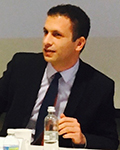2013
Stefanos Nikolaou Geroulanos
- Assistant Professor
- New York University

Abstract
This project examines the calls for the regeneration of human nature by European intellectuals in the period 1880-1935. Elements of the idea of a ’New Man’ date to the Enlightenment, but by 1935, major political projects (notably Nazism and Stalinism) explicitly sought to engineer new men. The research focuses on (a) the redeployment of existing philosophical and literary figures of utopia, perfectibility and human regeneration; (b) the development, in anthropology, psychology, and medicine, of conceptions of human nature that saw it as plastic and gave form to the hopes of social and human transformation; and (c) the aesthetic, urban, and political ‘New Man’ projects of the 1920s that used the above aesthetic and scientific techniques for perfecting and even overcoming man.
Abstract
During and after World War I, influential researchers working in physiology and related fields produced a shift in the understanding of how the organism responds to bodily injury. Turning away from localized responses to approaches highlighting bodily balance and disequilibrium, they developed ‘integrative’ theories intended to explain organismic response to aggression, especially in theaters of war. In their work, the organism faced with injury became an integral whole, often at the moment when it was most under threat. The aim of the project is to demonstrate how these researchers, working in disparate scientific disciplines, in different countries, and often without contact came together to reform concepts of bodily regulation that would become a major source for intellectual projects in Europe. Drawing on Meyers’s specialty in medical anthropology and the history of medicine, and Geroulanos’ expertise in cultural and intellectual history, this project plans to study as a group the work of a number of medical thinkers most of whom had little personal or institutional contact, among them William Bayliss, Walter B. Cannon, Henry Dale, Kurt Goldstein, Henry Head, René Leriche, W. H. R. Rivers, Hans Selye, Ernest Starling, and Fenton Turck. This project balances close readings of published works with the study of laboratory experiments and their premises, the novel study of images and films, literary works, and attention to policy and regulatory changes, thus affecting the way that injured bodies were regarded and treated for many years beyond the historical frame of the war. The study will result in a co-authored book that contributes to scholarship on the representation of the body, especially in the context of the linked histories of war and the body, as well as to a greater appreciation of the place of medical thought more generally within European intellectual history and philosophy. Geroulanos and Meyers have several previous collaborations, including a German-language book, Experimente im Individuum (August Verlag, 2013), and co-edited volumes and translations. Award period: July 1, 2013 – December 31, 2014

